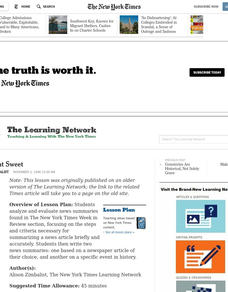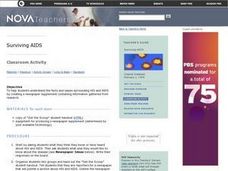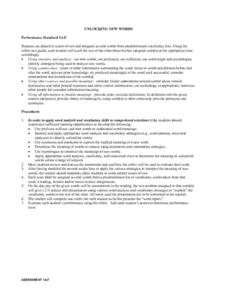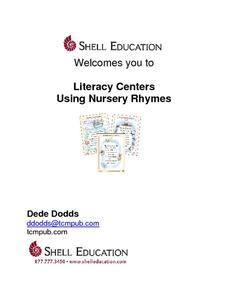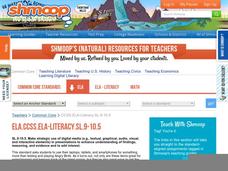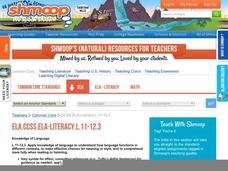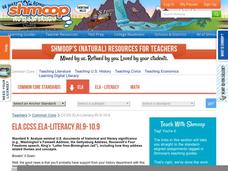Curated OER
Laughing Matters
Is laughter really the best medicine? Middle and high schoolers discuss the truth behind this adage by reading and discussing a New York Times article about Dr. Patch Adams. They participate in a round-table debate in response to...
Curated OER
Short But Sweet
After analyzing and evaluating news summaries found in the New York Times "Week in Review" section, middle schoolers study the steps for summarizing a news article briefly and accurately. They write two news summaries: one on a newspaper...
University of Minnesota
Mirroring Emotions
Do you ever give your class the "teacher look"? Without saying a word, they become silent and engaged (hopefully). How do they know what you're thinking? Explore the concept of nonverbal communication and how it relates to our mirror...
Curated OER
Creature Seekers
Does it actually exist? Consider the sighting of a giant squid, much like the one that appears in 20,000 Leagues Under the Sea. Middle and high schoolers read the article One Legend Found, Many Still to Go, and research other mysterious...
Curated OER
Following the Leaders
Examine the historic election of Pope Benedict XVI and reflect on the challenges he faces as the new leader of the Catholic Church. This New York Times lesson investigates how other world leaders are chosen in different forms of...
Curated OER
The War of the Words
“Who’s This Guy Dylan Who’s Borrowing Lines From Henry Timrod?” The basic question in this lesson from the New York Time’s Learning Network is whether artists and authors who use the words of others are stealing from that artist or...
Curated OER
Surviving AIDS
Enhance your middle and high schoolers' research skills with this instructional activity. After viewing a video clip about HIV and AIDS, high schoolers identify the facts and issues surrounding the disease. They work together to create a...
Curated OER
Denial on Trial
What is the "Faurisson Affair”? What is “Holocaust Revisionism”? What does freedom of speech entail? Do revisionists have a right to voice their ideas? Such questions are at the heart of a richly detailed, thought provoking lesson...
Curated OER
Unlocking New Words: Partner Presentations
Following extensive modeling about how to apply word analysis and vocabulary skills to learn new words, partner teams create brief word presentations to teach new vocabulary to the class. Preselect words from upcoming social studies,...
Florida Center for Reading Research
Dictionary Cube
Young scholars investigate new vocabulary words with a fun, collaborative activity. Given a deck of word cards, pairs of students flip over one at a time and independently look up the term in a dictionary. They then take turns rolling a...
Curated OER
Literacy Centers Using Nursery Rhymes
And in this corner we have Little Jack Horner. Engage your learners with phonemic awareness activities that encourage them to play with language. Eight different categories of phonemic awareness activities are detailed in the resource...
Shmoop
ELA.CCSS.ELA-Literacy.SL.9-10.5
High schoolers know how to use technology, but they often need more training on how to use it effectively for educational or professional purposes. Try out the activities described here to get your pupils thinking about interesting ways...
Shmoop
ELA - Literacy.CCSS.ELA-Literacy.RST.9-10.6
Key to understanding scientific or technical texts is identifying the underlying question the author is attempting to answer. Provide your young scientists with an opportunity to practice identifying these questions and the procedures...
Shmoop
ELA - Literacy.CCSS.ELA-Literacy.RH.9-10.1
Do your pupils know what a primary source is? How about a secondary source? Provide them with the information here about different types of documents and then test their knowledge with a brief quiz. The quiz is made up of two documents....
Shmoop
ELA.CCSS.ELA-Literacy.W.11-12.7
Your pupils are beginning their research project and are having a hard time narrowing their topics down. If you’re not sure how to help them, then start here. Provided is a student dialogue that works though the issues of narrowing a...
Shmoop
ELA.CCSS.ELA-Literacy.W.9-10.7
Considering adding more research to your curriculum? Check out this idea. The assignment example, which connects to the Common Core, is written for a lesson on "The Scarlet Ibis." However, you could adapt the bigger idea to almost any...
Shmoop
ELA.CCSS.ELA-Literacy.L.11-12.3
Tired of simple sentences? Bored by brief sentences? Plagued by boring sentences? Enrich your life and the writing of your pupils by modeling how to combine sentences to create more varied syntax. Groups then find a number of ways to...
Shmoop
ELA.CCSS.ELA-Literacy.W.9-10.9
Encourage your pupils to support their claims with textual evidence, whether is is from literary texts or informational texts. You might use the assignment example, which suggests an assignment on what it's like to be an immigrant in...
Shmoop
ELA.CCSS.ELA-Literacy.W.11-12.4
Although it does not properly address how to use the Common Core standard, this resource does provide a decent writing prompt that explores how minor characters influence Hamlet's decisions throughout the play. The prompt can be used for...
Shmoop
ELA.CCSS.ELA-Literacy.RL.11-12.1
All the Common Core standards are important, but they all build off the ability to cite textual evidence to support analysis. See how to scaffold this standard into three steps of development, along with assessment ideas with the ideas...
Shmoop
ELA.CCSS.ELA-Literacy.RI.11-12.3
Make analyzing the sequence of events in an informational text easy. Ask readers to craft a one-sentence summary of each paragraph in a document and create a text map. To demonstrate their understanding of the process, participants read...
Shmoop
ELA.CCSS.ELA-Literacy.L.11-12.5
"Timid, scared, terrified." High school scholars examine words, their denotations and connotations, in a series of exercises that use lines from Shakespeare to explore figurative language and word relationships. Participants then...
Shmoop
ELA.CCSS.ELA-Literacy.RI.9-10.9
With a nice description of what the standard means, an idea for a class activity, and a quiz with answers, this resource should deepen your (and your pupils') understanding of the targeted Common Core standard. The provided activity is...
Curated OER
Vocabulary in Context: Test Yourself with the New York Times
Drawn from the New York Times' superb Learning Network program, this multiple choice question checks readers' knowledge of two vocabulary words in a paragraph from a review of the 2011 film Take Shelter. An interactive answer key clearly...
Other popular searches
- Media
- Media Education
- Communications and the Media
- Personal Finance
- Money Management
- Media Literacy
- Math Literacy
- Media Studies
- Adult Literacy
- Mass Media
- Media Organizations
- Digital Media



